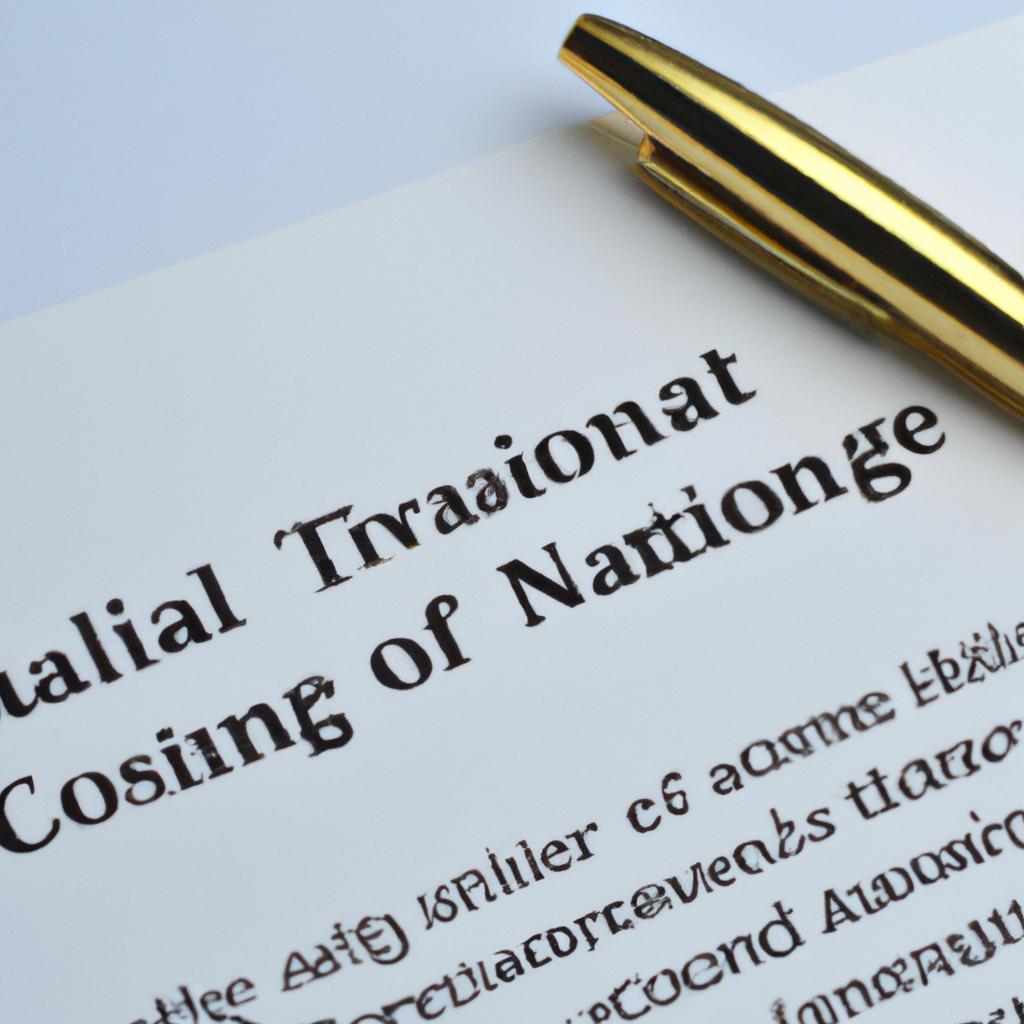Navigating the intricate process of transferring title of a deceased person’s assets can be a daunting endeavor, filled with potential legal pitfalls and complex procedures. As experienced practitioners in estate planning and probate law, our team at Morgan Legal Group in New York City is well-equipped to guide you through this intricate process with precision and expertise. In this article, we will delve into the essential steps and considerations involved in transferring title of a deceased person, providing you with vital insights to protect your interests and ensure a smooth transition of assets.
Understanding the Probate Process for Transferring Title of a Deceased Person
When a loved one passes away, the process of transferring title of their assets can be complex and overwhelming. Understanding the probate process is crucial in order to ensure a smooth transition of ownership. Probate is the legal process of proving a deceased person’s will in court and administering their estate. Here are some key steps to consider when transferring title of a deceased person:
- Locate the Will: The first step in the probate process is to locate the deceased person’s will. The will typically outlines how the deceased person’s assets are to be distributed.
- File the Will with the Court: Once the will is located, it must be filed with the probate court in the county where the deceased person lived.
- Appoint an Executor: The court will appoint an executor to administer the estate and carry out the wishes outlined in the will.
- Notify Creditors and Beneficiaries: The executor must notify creditors of the deceased person’s passing and make arrangements to pay off any outstanding debts. Beneficiaries named in the will must also be notified of their inheritance.

Key Considerations When Dealing with Inherited Property Title Transfers
When dealing with inherited property title transfers, it is crucial to understand the legal requirements and implications involved in the process. One key consideration is determining the appropriate transfer method based on the deceased person’s estate plan, if they had one. This may involve probate court proceedings, trust administration, or other legal mechanisms.
Another important consideration is ensuring that all necessary documents are in order and filed correctly with the appropriate government authorities. This includes obtaining a death certificate, updating property deeds, and complying with any specific state laws governing property transfers. It is highly recommended to seek the guidance of an experienced estate planning attorney to navigate the complexities of transferring title of a deceased person’s property smoothly and legally.

Navigating Complex Legal Requirements to Successfully Transfer Title
When a loved one passes away, navigating the complex legal requirements to successfully transfer title can be a daunting task. Understanding the process of transferring title of a deceased person is crucial to ensure that their assets are properly distributed. At Morgan Legal Group, we specialize in estate planning and probate law, and we are here to guide you through the intricacies of transferring title smoothly and efficiently.
One key step in transferring title of a deceased person is obtaining a death certificate. This document is essential in proving the individual’s passing and is required for various legal transactions. Additionally, it is important to identify all assets owned by the deceased, including real estate, bank accounts, and personal property. Working with a knowledgeable attorney can help you navigate the legal requirements involved in transferring these assets and ensuring that the title is successfully transferred to the appropriate beneficiaries.

Ensuring Compliance with New York State Laws for Title Transfer of Deceased Persons
When it comes to transferring the title of a deceased person in the state of New York, it is crucial to ensure compliance with all relevant laws and regulations. Failure to do so can result in legal complications and delays in the probate process. To navigate this complex process successfully, it is important to follow these key steps:
- Obtain the death certificate: The first step in transferring the title of a deceased person is to obtain a certified copy of their death certificate. This document is essential for proving the individual’s death and initiating the title transfer process.
- Determine the appropriate transfer method: Depending on the circumstances, the title transfer may need to be completed through a probate court proceeding or a non-probate transfer method such as joint tenancy, beneficiary designation, or a trust. Consulting with an experienced estate planning attorney can help you determine the most appropriate transfer method for your situation.
| Title | Key Information |
|---|---|
| Probate Process | Requires court supervision and can be time-consuming |
| Non-Probate Transfer | Can be faster and more streamlined, but requires careful planning |
Q&A
Q: What is the process for transferring the title of a deceased person’s property?
A: The process for transferring the title of a deceased person’s property involves several steps that must be completed in a timely manner.
Q: What documents are required to transfer the title?
A: The documents required to transfer the title of a deceased person’s property typically include the death certificate, the deceased person’s will (if one exists), and a transfer of ownership form.
Q: Do I need to probate the deceased person’s estate in order to transfer the title?
A: In some cases, it may be necessary to probate the deceased person’s estate in order to transfer the title of their property. This process can vary depending on the laws of the state where the property is located.
Q: What if the deceased person did not leave a will?
A: If the deceased person did not leave a will, their property will typically be transferred according to the laws of intestate succession in the state where the property is located.
Q: How long does it take to transfer the title of a deceased person’s property?
A: The timeline for transferring the title of a deceased person’s property can vary depending on factors such as the complexity of the estate and any disputes that may arise among heirs or beneficiaries.
Q: Can I transfer the title of a deceased person’s property on my own?
A: It is possible to transfer the title of a deceased person’s property on your own, but it is recommended to seek the advice of a legal professional to ensure that the process is completed correctly and in compliance with applicable laws.
The Way Forward
In conclusion, transferring the title of a property from a deceased person can be a complex process, but with the right guidance and understanding of the necessary steps, it can be completed successfully. By following the guidelines outlined in this article, you can navigate the legal requirements and ensure a smooth transition of ownership. Remember to seek legal advice and support when needed, and always stay organized and patient throughout the process. With determination and diligence, you can honor the wishes of your loved one and secure the rightful title of their property. Good luck with your transfer of title journey!
 As the saying goes, death and taxes are the only two certainties in life. And while the loss of a loved one is always a difficult time, it’s important to ensure that their assets and property are properly transferred and distributed according to their wishes. One crucial aspect of this process is transferring the title of a deceased person. In this article, we’ll discuss the steps involved in transferring the title of a deceased person, including key terms and important considerations. We’ll also offer some practical tips and advice to make the process as smooth as possible.
As the saying goes, death and taxes are the only two certainties in life. And while the loss of a loved one is always a difficult time, it’s important to ensure that their assets and property are properly transferred and distributed according to their wishes. One crucial aspect of this process is transferring the title of a deceased person. In this article, we’ll discuss the steps involved in transferring the title of a deceased person, including key terms and important considerations. We’ll also offer some practical tips and advice to make the process as smooth as possible.
Key Terms to Know
Before we dive into the specifics of transferring title, it’s essential to understand some key terms that are commonly used in this process.
1. Probate – Probate is the legal process of proving a will and distributing assets after a person’s death.
2. Executor – An executor is a person appointed by the deceased to carry out the instructions in their will and distribute their property.
3. Intestate – A person is deemed intestate if they pass away without a will. This means that their assets will be distributed according to state laws rather than their personal wishes.
4. Inheritance – Inheritance refers to the assets and property that are left to someone after a person’s death.
5. Beneficiary – A beneficiary is someone who receives a portion of an estate according to the deceased’s will or state laws.
Now that we have a basic understanding of these terms, let’s delve into the steps involved in transferring title of a deceased person’s assets.
1. Determine the type of property
The first step in transferring title is to determine the type of property involved. Is it real estate, a vehicle, or a bank account? Each type of property may have different requirements and processes for title transfer. For instance, transferring ownership of a house or land may require a deed, while a vehicle may require a death certificate and title transfer application. It’s essential to do your research and gather all the necessary documents for the type of property you will be transferring.
2. Locate the will or determine if the deceased was intestate
If the deceased had a will, it’s crucial to locate it as it will outline their wishes for the distribution of their assets. If there is no will, then the process may become more complicated, as state laws will dictate how the assets will be distributed. In this case, it’s best to consult with an attorney who specializes in probate to determine the appropriate steps to take.
3. Obtain a death certificate
A death certificate is a legal document that proves someone has passed away. This document is required for many steps in the title transfer process, including transferring bank accounts and vehicles. The funeral home will typically help with obtaining a death certificate, but it can also be obtained from the vital records office in the state where the person passed away.
4. File for probate
Once all the necessary documents have been gathered, it’s time to file for probate. This is the legal process of proving the will and distributing assets according to the deceased’s wishes. If the person was intestate, the court will appoint an administrator to carry out the distribution of the assets. This process can take several months or even years, depending on the size and complexity of the estate.
5. Transfer title of the property
Once the will has been proven or the administrator has been appointed, it’s time to transfer the title of the property. As mentioned earlier, this process will vary depending on the type of property involved. If the deceased owned real estate, a deed will need to be created and recorded with the county where the property is located. For vehicles, the death certificate and title transfer application will be needed, along with any other required documents, to transfer ownership.
Practical tips and additional considerations
-Be organized: Keep all documents, including the will, death certificate, and deed, in a safe place. This will make the process of transferring title much easier and less stressful.
-Be cautious when dealing with banking and financial institutions: If the deceased had a bank account, it’s important to contact the bank as soon as possible to freeze the account. This will prevent any unauthorized access to funds.
-Consider the tax implications: Depending on the size of the estate, there may be tax implications for beneficiaries. It’s best to consult with an accountant or attorney to determine any inheritance or estate taxes that may need to be paid.
-Keep track of expenses: If you are the executor of the will, it’s crucial to keep track of any expenses related to the estate. These may be reimbursed later once the assets have been distributed.
-Seek professional help: While it’s possible to transfer title and distribute assets without professional help, it may be beneficial to consult with an attorney or financial advisor who specializes in probate to ensure that everything is done correctly and in compliance with state laws.
In conclusion, transferring title of a deceased person’s assets can be a complex and lengthy process. It’s important to stay organized, gather all the necessary documents, and seek professional help if needed. By following the steps outlined in this article and keeping these practical tips in mind, you can make this process smoother and ensure the deceased’s wishes are carried out as intended.








